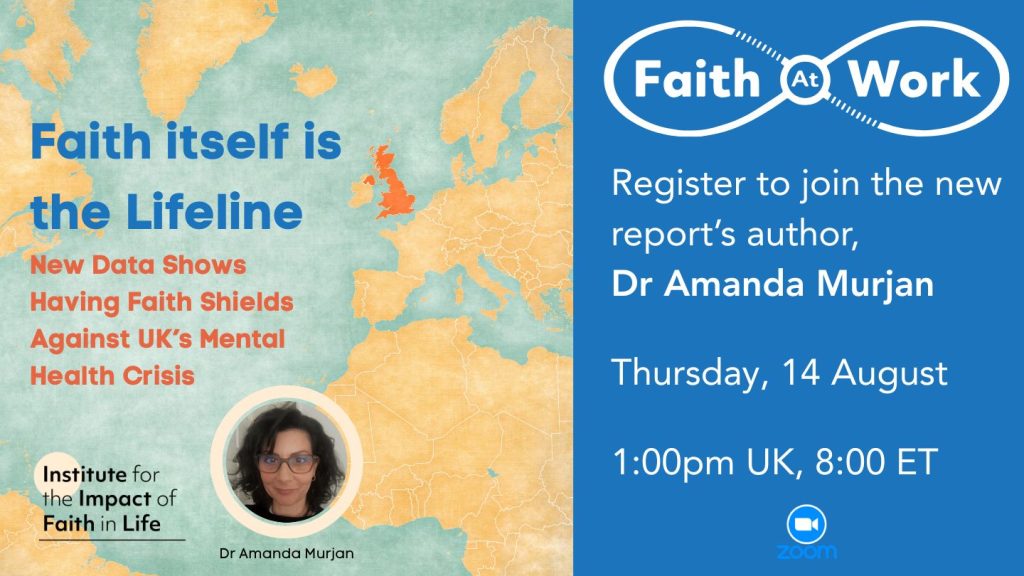Faith itself is the Lifeline: New Data Shows Having Faith Shields Against UK’s Mental Health Crisis
Join the UK Faith@Work network on 14th August to hear from Dr Amanda Murjan, the author of the just-released report from the Institute for the Impact of Faith in Life (IIFL), how faith offers a powerful counterpoint as the UK and UK workplaces grapple with rising levels of loneliness, anxiety and mental distress.
- — When: Thursday, 14 August, 1:00-1:30 UK (8:00-8:30 ET)
- — Discussion of report’s significance by IIFL’s Dr Amanda Murjan
- — Registration required (free)
‘Faith & Happiness: How Religious Belief Shapes Britain’s Emotional Wellbeing‘ examines how religion influences experiences of wellbeing and attitudes towards mental health by comparing the UK’s two largest religious groups, Christians and Muslims, to those without faith. Through a nationally representative survey of 2068 UK adults and a series of in-depth interviews, this report explores the experiences of religious and non-religious people in relation to a range of wellbeing measures, including life satisfaction, worry and anxiety, low mood and depression, loneliness, and attitudes to mental health.
Research in this area often relies heavily on statistical data, but this report adopts a mixed-methods approach. By asking individuals to describe in their own words how their faith helps improve their emotional wellbeing, this report can explore how they use those beliefs, especially in moments of stress, to restore clarity, calm, and control.
Dr Amanda Murjan, IIFL research associate and report author remarks:
“Faith can significantly boost our emotional well-being. Our research shows that certain character strengths and skills tend to be more developed in people of faith compared to those without, which may help promote greater well-being. People of faith are more likely to actively seek a deeper sense of balance and harmony in their lives and accept life’s circumstances. They are more inclined to recognise positives in life, stay optimistic, and adapt to life’s unpredictability, trusting that all difficulties will eventually pass. Faith is linked to a strong sense of self-efficacy, self-reliance, and greater trust in personal resources to handle life. All these factors contribute to higher life satisfaction, less worry, and improvements in overall emotional health.”
Dr Amanda Murjan completed a PhD in Theology with a specialist interest in psychology at the Centre for Catholic Studies at Durham University. Her thesis examined papal teaching on human flourishing using Carl Jung’s psychoanalytical theory and positive psychology. She is also a research fellow at Birmingham University studying the role of spiritual practices in UK African and Afro-Caribbean Churches in cultivating human flourishing by providing resources to cope with and challenge racism. Amanda also holds a postdoctoral research position at Durham University, working on an international project examining Catholic lay participation in church governance.


